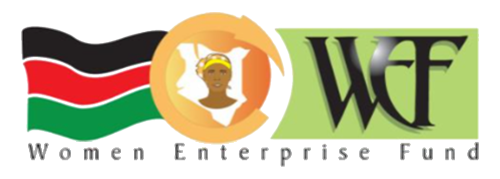The Women Enterprise Fund (WEF) was established vide Legal Notice No. 147: Government Financial Management (Women Enterprise Fund) Regulations, 2007 with the core mandate of women economic empowerment. The object and purpose are to provide loans and business support services for women micro, small, and medium enterprises. The Fund implements its mandate through five-year strategic plans that align its activities with national, regional, and global development priorities.
The Strategic Plan 2023 – 2027 is is aligned with Kenya Vision 2030, the Bottom-up Economic Transformation Agenda, the Fourth Medium Term Plan, the Africa Agenda 2063, The EAC Vision 2050, and the Sustainable Development Goals. The Strategic plan is guided by the Fund’s Vision “a sustainable Fund empowering Kenyan women for social and economic development” while the Mission is “to facilitate women socioeconomic empowerment by providing access to credit, capacity building, market linkages, market infrastructure, and domestic and international trade and through utilization of technological innovations.” The core values and guiding principles are Integrity, Professionalism, Equality and Equity, Transparency and Accountability, Innovation, Teamwork, and Diversity and Inclusivity. The WEF Slogan is - “When you empower a Woman, you empower a Family and a whole Nation.”
The Strategic Plan (2023-2027) identifies five Key Result Areas (KRAs) namely, KRA1. Fund growth concerned with sustainable operations with surplus, KRA2. Financial inclusion interested in expansion of loan access to unreached women, KRA3. Capacity building addresses the skills gap inhibiting women from running successful MSMEs, KRA4. Market accessibility addresses the need to bolster marketing of women products, and KRA5. Institutional development concerned with the capacity of the WEF to deliver on its mandate. Under each Key Result Area, strategic objectives were formulated. Realization of these strategic objectives will be supported by various strategies and activities. Key responsibility areas have also been identified alongside the annual targets
Our Strategic Objectives by 2027
- To grow the Fund value to Ksh.10B through the following strategies:
a. Timely and full loan repayment
b. Resource mobilization and revenue growth
c. Cost Reduction - To expand financial access for 5 million women entrepreneurs through the following strategies:
a. Product diversification
b. Diversify marketing.
c. Diversify delivery channels - To enhance capacity for 515,000 women entrepreneurs on financial literacy, Value addition, AGPO and Business Counselling through the following strategies:
a. Financial literacy, business development, digital literacy training
b. Value addition training
c. AGPO Capacity Building
d. Business counselling, mentorship, and coaching - To improve market access for 105,500 women entrepreneurs through linkages, market facilitation and decent workplace through the following strategies:
a. Domestic and international trade facilitation
b. Linkages for women entrepreneurs with large enterprises
c. Incubation of women enterprises. - To strengthen human capital, policies, processes, and technology through the following strategies:
a. Systems and policies alignment
b. HR alignment and modernization
c. Governance and risk management
Women form a substantial number of the SMEs with 31.4 percent of the SMEs in Kenya female owned and 17% co-owned by both men and women. Successful implementation of the strategic plan will require robust resource mobilization, review of the internal policies and procedures, enhancement of partnerships and collaborations, enhanced communication and stakeholder engagement as well as strengthening and enhancement of the organizational structure to ensure it drives the Strategic Plan. The Board will provide support in these key areas as well as provide oversight through support to capacity enhancement, adequate monitoring, evaluation, and implementation of the requisite reporting systems.
